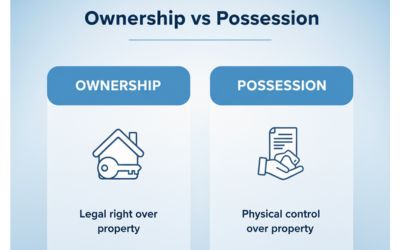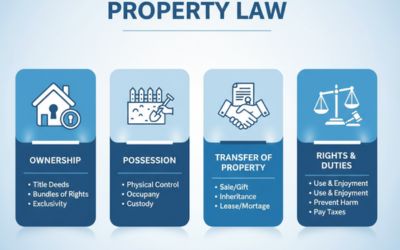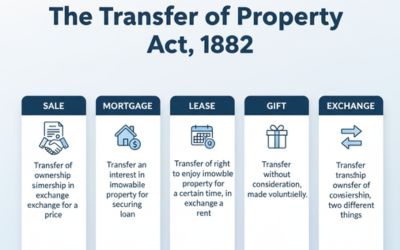Umadevi Nambiar v. Thamarasseri Roman Catholic Diocese (2022) 7 SCC 90

Quick Summary
The dispute is about sales done by a sister who acted under a power of attorney that was later cancelled. The buyer traced title through those sales. The Supreme Court held: a person without authority cannot pass full title. In partition, alienations bind only the transferor’s share. Equities can be balanced in the final decree by allotting the sold portion to that share, if possible.
Issues
- Is there a binding sale when the seller/agent lacks clear authority to sell?
- Can courts cancel or limit alienations under TPA ss. 3, 7, 8, 41, 54 in a partition dispute?
Rules
- Authority & Capacity (TPA ss. 3, 7, 8): Only a person competent and authorized can convey title.
- Sale (TPA s. 54): A sale transfers ownership only when legal requirements are met.
- Ostensible Owner (TPA s. 41): A bona fide buyer may be protected if the seller appears authorized and the buyer acted in good faith with due care.
- Co-sharer Principle: Alienees and the co-sharer can sustain the transfer to the extent of the transferor’s share. In final decree, the sold plot may be allotted to that share to do equity.
Facts (Timeline)
Original Owner Succession
Property of U. Sankunni devolved on two daughters; one is the Appellant, Umadevi Nambiar.
21-07-1971 GPA Executed
Appellant gave a general power of attorney to her sister, Smt. Ranee Sidhan.
31-01-1985 GPA Cancelled
The power of attorney was revoked by the Appellant.
After GPA Alienations
Sister executed four documents assigning/releasing parts to third parties; later those alienees sold to the Respondent Diocese.
First Suit Preliminary Decree
Appellant sued assignees; learned in the decree about sales to the Respondent.
Second Suit Partition
Appellant sought partition and separate possession of her half share.
Trial Court For Appellant
Preliminary decree granted in favour of the Appellant.
High Court Reversed
Allowed Respondent’s appeal; held failure to seek recovery of possession was fatal.
Supreme Court Final Word
Set aside High Court and restored the Trial Court’s preliminary decree.

Arguments
Appellant (Umadevi Nambiar)
- Agent had no authority after GPA cancellation; sales cannot bind beyond sister’s own share.
- Partition court can adjust equities; no need to challenge every deed separately.
- Seek separate possession of half share with suitable allotment.
Respondent (Diocese)
- Relied on chain of transfers; buyer protection and development done on land.
- Appellant knew of transactions (acquiescence); she should have sued to set aside deeds and for recovery.
- High Court view: absence of relief for possession was fatal.
Judgment
The Supreme Court allowed the appeal. It set aside the High Court’s decision and restored the Trial Court’s preliminary decree. The Court noted that the sister lacked competence to sell beyond authority. Awareness and development may show acquiescence, but they do not cure lack of power. In partition, alienations can be sustained only to the transferor’s share, and equities can be worked out in the final decree.

Ratio
- No authority, no title: a sale by a person without power cannot bind the co-owner’s entire property.
- Alienations stand only to the extent of the transferor’s share; allotment can align with that share in the final decree.
- Ostensible owner protection requires good faith and due care; it cannot stretch beyond the seller’s authority.
Why It Matters
The ruling gives a clear, student-friendly rule for partition cases with disputed sales: sustain the sale only up to the seller’s share and use the final decree to balance equities. It reduces needless multiplicity of suits and clarifies how TPA sections interact with co-sharer rights.
Key Takeaways
- Cancelled GPA = no authority afterwards.
- Sales by a co-sharer/agent bind only that share.
- Final decree can allot the sold plot to that share to do equity.
- TPA ss. 3, 7, 8, 41, 54 guide capacity, effect, ostensible ownership, and sale.
- Awareness of development ≠ automatic loss of share; courts weigh equities.
Mnemonic + 3-Step Hook
Mnemonic: “AUTH–SHARE–EQUITY”
- AUTH: Check authority first.
- SHARE: Bind only the seller’s share.
- EQUITY: Use final decree to balance fairness.
3-Step Hook: Verify power → Limit to share → Allot in decree.
IRAC Outline
Issue
Do sales made without valid authority bind the entire property, and must each sale deed be individually set aside in a partition case?
Rule
- Authority and capacity under TPA are mandatory.
- Co-sharer’s transfer binds only that share.
- Final decree may allot sold land to that share to do equity.
Application
Here, sister had no power after GPA cancellation. Alienations cannot pass more than her share. Equity can still protect bona fide arrangements through allotment.
Conclusion
Appeal allowed; High Court reversed; Trial Court’s preliminary decree restored with scope to balance equities in final decree.
Glossary
- Alienation
- Transfer of property (sale, release, assignment) by an owner or holder.
- Ostensible Owner
- A person who appears to be owner; buyer may be protected if acting in good faith with due care.
- Final Decree
- Stage in partition where exact plots are allotted to shares decided earlier.
FAQs
Related Cases
Co-sharer Alienations
Cases where sale binds only the seller’s undivided share; allotment in final decree.
Ostensible Owner & Good Faith
Key rulings on Section 41 TPA and buyer protection limits.
Share
Related Post
Tags
Archive
Popular & Recent Post













































































































Comment
Nothing for now